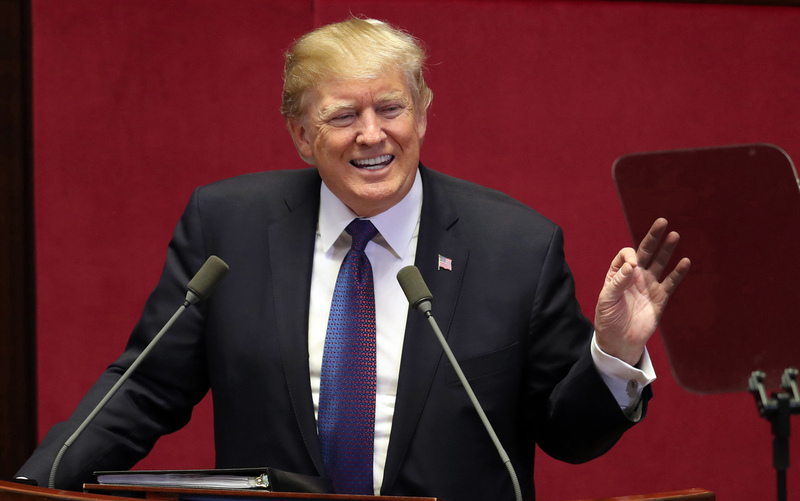 |
|
US President Donald Trump delivers an address to the National Assembly on Nov. 8. It was the first time a US President had spoke at the venue since Bill Clinton in 1993. (by Kang Chang-kwang, staff photographer)
|
Experts expect little change from Kim regime following call for maximizing international pressure
US President Donald Trump vehemently denounced North Korea in a National Assembly address on the morning of Nov. 8, describing South and North Korea as respectively good and evil. Stressing “peace through strength,” Trump hinted at plans to force North Korea to denuclearize by isolating its regime to a level it cannot withstand through sanctions and international pressure. The DMZ was singled out in Trump’s speech as particularly symbolic. Calling it the “line that today divides the oppressed and the free,” Trump said the “flourishing ends and the prison state of North Korea, sadly, begins” once the line is crossed. “It is the line between peace and war, between decency and depravity, between law and tyranny, between hope and total despair,” he also said. Characterizing the difference between South and North in quasi-religious terms, he described the area south of the DMZ as a place “of freedom and justice, of civilization and incredible achievement,” and north of it as one of “tyranny, fascism and oppression.” Trump’s rhetoric echoed the Bush administration’s characterization of North Korea as an “outpost of tyranny” and part of an “axis of evil.” It’s a frame in which the policy focus is not on the North Korean nuclear issue per se, but on North Korea itself. The exclusive emphasis on pressure in the speech by Trump – who has adopted “maximum pressure and engagement” as the keynote for his North Korea policy – appears to fall along similar lines. “All responsible nations must join forces to isolate the brutal regime of North Korea,” he declared, adding that they “cannot supply [and] cannot accept” it in any form. “We call on every nation, including China and Russia, to…downgrade diplomatic relations with the regime, and sever all ties of trade and technology,” he continued. Trump also took direct aim at one of Pyongyang’s sorest spots: its “supreme dignity,” [leader Kim Jong-un]. Directing a message to Kim as the “leader of the North Korean dictatorship,” he warned, “The weapons you are acquiring are not making you safer. They are putting your regime in grave danger.” “North Korea is not the paradise your grandfather envisioned. It is a hell that no person deserves,” he added. While Trump used a number of inflammatory terms about North Korea and its leadership – “cruel dictatorship,” “tyranny,” “military cult,” “prison state,” and “hell” among them – he avoided references to possible military action, as with his past remarks about “fire and fury” and “totally destroy[ing]” North Korea. He also held out a slim possibility for dialogue, echoing his remarks the previous day when he said in a joint press conference with South Korean President Moon Jae-in that he saw “certain movement” on possible direct dialogue between North Korea and the US. But this time, it was qualified. “Despite every crime you [Kim] have committed against God and man . . . we will offer a path to a much better future,” he said. Stressing that the US “seek[s] a future of light, prosperity, and peace,” Trump shared a dream of “this nuclear nightmare [being] replaced with the beautiful promise of peace.” At the same time, Trump said the path to such a future “begins with an end to the aggression of your [Kim’s] regime, a stop to your development of ballistic missiles, and complete, verifiable, and total denuclearization.” In other words, North Korea’s denuclearization is a precondition for dialogue. “What you can see from the speech is that President Trump’s views on North Korea are rooted in predictions of a regime collapse, and his North Korea policy follows a sequence of maximum pressure leading to North Korea’s capitulation, and only then to engagement [dialogue],” said Inje University professor Kim Yeon-chul. “It’s hard to have an optimistic outlook on the prospects for North Korea-US relations when [Trump’s policy approach] consists of a mix of policies that failed in the past,” Kim predicted. It also potentially rules out assessments that North Korea’s long “silence” since Sept. 15 means an effective moratorium on nuclear and missile testing that could allow for attempts to turn the situation around. “If the Barack Obama administration’s ‘strategic patience’ approach was about not having dialogue with Pyongyang, then the Trump administration has basically laid the groundwork for tougher pressure on Pyongyang by repudiating its regime and harshly criticizing and insulting its leader,” said an inter-Korean relations expert who was part of Moon’s campaign during his presidential run. “Conversely, from North Korea’s standpoint this confirms the US’s ‘hostile policies’ and gives it an excuse to further accelerate the ‘competition of national nuclear armament,’” the expert said. University of North Korean Studies professor Yang Moo-jin similarly predicted Pyongyang would “conclude that nothing has changed in terms of Washington’s hostile policies toward the North.” “We can’t rule the possibility that North Korea will continue voicing its position that a peace regime needs to come before denuclearization, while conducting more shows of force to show that it can stand up to the US,” Yang said. By Jung In-hwan, Kim Ji-eun, and Noh Ji-won, staff reporters Please direct questions or comments to [english@hani.co.kr]






